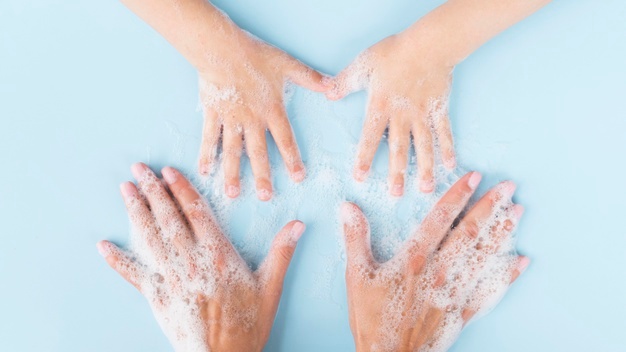Healthcare facilities are still a place of healing, but what if instead of healing, the opposite happens: and you get sick ? What we were less aware of just a few years ago, is unfortunately becoming more present today, also due to the Corona pandemic: Deaths resulting from infections in health care facilities. In Europe alone, 33,000 patients die every year as a result of infection with hospital germs. In order to counteract this sad trend, the Semmelweis Foundation is for more awareness on the subject of hand disinfection and hygiene measures in healthcare facilities and is once again urging decision-makers in politics, business and health to focus more on the simple but important method of prevention.
Simple but effective: On the occasion of Global Handwashing Day, the simplest but most effective method of prevention in the fight against germs and infections must once again be brought into the public eye: Hand washing and, at the clinic level, alcohol-based hand hygiene are important factors in protecting particularly vulnerable groups. Based on the findings of the physician Dr. Ignaz Semmelweis, who saved the lives of thousands of women 170 years ago simply by disinfecting their hands, the Semmelweis Foundation, has still the goal of further promoting hygiene measures as the key to active prevention of nosocomial infections in clinics, nursing homes and homes for the elderly.
The fact that this requires constant reminders is demonstrated not only by the Corona pandemic, but also by the still too high number of infections with hospital germs. According to the European Centre for Disease Prevention and Control (ECDC), more than 4.1 million patients in the European Union contract nosocomial infections (hospital-acquired infections) every year. These are alarming figures, which should put political, health and economic decision-makers on their guard.
Improved hygiene measures possible reason for fewer multidrug-resistant germs
Since the outbreak of the global COVID-19 pandemic, increased attention has been paid to hygiene measures again. The positive side effects of thorough hand washing, hand disinfection, mask wearing and increased attention to these measures in everyday hospital life were particularly evident during the second wave: at the first digital conference of the Semmelweis Foundation, where more than 300 experts discussed the lessons learned from the pandemic in the field of hospital hygiene, showed a pleasing trend toward a decrease in multidrug-resistant germs during this period. The researchers attribute this eye-opening interference primarily to improved hygiene measures in general and in hospitals in particular.
Drawing attention to this issue is not only a long-cherished goal of the Semmelweis Foundation, but also an important topic that will occupy political, economic and health officials even more in the future. After all, antibiotic-resistant germs, which can develop into a global threat to our health care system due to the incorrect and increased use of antibiotics, have already been identified by the WHO as the next major challenge for health care systems worldwide. Estimates suggest that the number of deaths worldwide attributable to antimicrobial-resistant infections could rise to 10 million by 2050 – from around 700,000 now.
“All of us who work in the healthcare sector should definitely keep an eye on the spread of multidrug-resistant germs. Currently, they are only a limited problem in daily life, but in hospitals and healthcare facilities they can become life-threatening to patients who are already weakened and therefore easily attacked. Staff can also become infected and thus become a greater danger to other groups of people. In order to stop these worrying developments, our motto, in agreement with the WHO, is quite clear: Clean hands – Save lives! “, explains Bernhard Küenburg, President of the Foundation.
Villach hospital shows how it can work
The LKH Villach recently showed how a reliable routine for hand hygiene can be successfully integrated into everyday hospital life. It was the first Austrian hospital ever to take part in the “European Hand Hygiene Excellence Award” and promptly brought the renowned WHO prize to Austria. A lecture by Semmelweis Foundation founder Bernhard Küenburg on the occasion of Hand Hygiene Day was the decisive motivator for the hospital’s medical director, Dr. Elke Schindler, to have the structures and procedures for proper hand disinfection, which she and her team successfully implement every day, reviewed by the WHO’s top experts, thus paving the way for the award. As a former quality assurance physician, Dr. Schindler understands the value of consistent hand hygiene, which provides important protection not only for her patients, but also for her clinic staff and visitors. On September 14, 2021, the award was accepted by Prof. Didier Pittet of the WHO at the ICPIC (International Consortium for Prevention and Infection Control) in Geneva.
Sources directory




